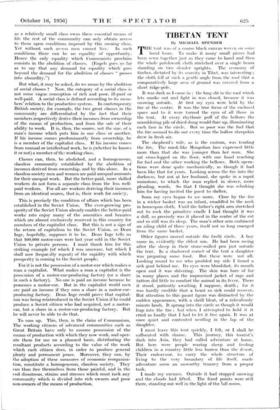TIBETAN TENT
By MICHAEL SPENDER
THE tent was of a coarse black canvas woven on some hand loom. To make it many small pieces had been sewn together just as they came to hand and then the whole patchwork cloth stretched over a single beam standing oil two slender uprights. The economy of timber, dictated by its scarcity in Tibet, was interesting ; the cloth fell at such a gentle angle from the roof thht a comparatively large area of ground was covered from a short ridge-pole.
It was dark as I came in ; the long slit in the roof which lets smoke out and light in was closed, because it was snowing outside. At first my eyes were held by the fire at the centre. It was the true focus of the enclosed space and to it were turned the eyes of all those in the tent. At every rhythmic puff of the bellows the smouldering pile of dried dung would flare up, illuminating each face in the circle. But so poor was the fuel that the fire seemed to die out every time the hollow sheepskin drew in fresh air.
The shepherd's wife, as is the custom, was .tending the fire. The mask-like Mongolian face expressed little more than that she was Younger than her man. She sat cross-legged on the floor, with one hand reaching for fuel and the other working the bellows. Both opera- tions were done quite mechanically, as though it had been like that for years. Looking across the fire into the darkness, but not at, her husband, she spoke in a rapid monotone, to which the man replied in slower, more pleading, words. So that I thought she was rebuking him for having invited the guest to shelter.
Soon my eyes began to see more. • Close. by the fire in a wicker basket was an infant, swaddled to the neck in homespun cloth. Until the father's right arm stretched out to rock the primitive cradle I had thought it was a doll, so precisely was it placed in the centre of the cot and so still was its sleep. The man's other arm embraced an ailing child of three years, itself not so long emerged from the same basket.
Other figures moved outside the firelit circle. A boy came in, evidently the eldest son, lie had been seeing after the sheep in their stone-walled pen just outside the tent. In a shadowed corn eir of the tent a daughter was preparing some food. But these were not all. Looking round to see who prodded my side I found a sick goat behind me. Its eyes were bloodshot, its mouth open and it was shivering. The skin was bare of fur in many places and the improvised jacket of rags and tatters did little to comfort the animal in its fever. There it stood, patiently awaiting, I suppose, death ; for it was hardly credible that a beast so sick could recover_ But attention to this gaunt figure was distracted by the sudden appearance, with a shrill bleat, of a ridiculously minute lamb. It sprang into the circle as though it would leap into the fire ; but when I attempted to hold it it cried so loudly that I had to let it free again. It was at once quiet and contented nestling in the .1ap of the daughter.
I must leave this tent quickly, I felt, or I shall, be suffocated with shame. This journey, this tourist's dash into Asia, they had called adventure at home. But here were people rearing sheep and feeding children in a country little less barren than the desert. Their endeavour, to carry the whole structure of living to the very boundary of life itself, made adventure seem an unworthy truancy from a proper task.
I made my excuses. Outside it had stopped snowing and the, clouds had lifted. The fixed points were still there, standing Out Well in the light of the full moon.




















































 Previous page
Previous page